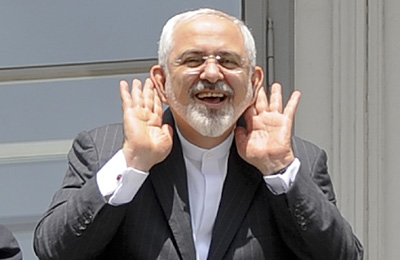
Zarif ... most effective. EPA/Herbert Neubauer
Zarif's 'smile diplomacy' secures deal
DUBAI, July 14, 2015
By Bozorgmehr Sharafedin
It is hard to picture Iran's nuclear talks with world powers without the beaming face of Foreign Minister Mohammad Javad Zarif who, in reaching a deal, has shown the power of what Iranians call his 'smile diplomacy'.
The 55-year old career diplomat led Iran's negotiating team in concluding a deal with world powers in Vienna on Tuesday after almost two years of negotiations, to curb Iran's nuclear programme in exchange for sanctions relief after decades of tensions with the West.
But Zarif, who has spent long spells studying or working in the United States, needed the support of President Hassan Rouhani, and the cautious backing of Supreme Leader Ali Khamenei, to protect him from domestic opponents whose distrust of the West has characterised Iranian policy since the 1979 Islamic Revolution.
"Zarif is the most effective diplomat Iran has had since the revolution," said Karim Sadjadpour, an analyst at the Carnegie Endowment for International Peace.
"He is the only man in the world that can have a conversation with (US Secretary of State) John Kerry one day and Ali Khamenei the next, and reassure both of them that he shares their end game."
FIRST-NAME TERMS
His easy smile and mastery of English helped him build up a rapport with foreign diplomats, particularly Kerry, with whom he is on first-name terms. He also shunned the bombastic and confrontational language that had become the hallmark of the Islamic Republic's officials.
"When Zarif and his team started doing the negotiations in 2013, the whole atmosphere of the room changed," said John Limbert, former deputy assistant secretary of state for Iran at the State Department.
"Kerry and Zarif have a similar approach to diplomacy. What strikes me in both of them is that they understand the importance of being patient. They have the ability to listen, to be persistent and never give up."
Zarif's familiarity with Western culture comes from time living in the United States, first from the age of 17 as a student in San Francisco and Denver and subsequently as a diplomat to the United Nations in New York, where he served as Iranian ambassador from 2002 to 2007.
He developed direct contacts with US officials, despite this being a political taboo back in Iran, which served him well in the 1990s when he was involved in negotiations to free US hostages held by the pro-Iranian Hezbollah group in Lebanon.
DIVISIVE FIGURE
His seeming ease with Western ways has made him a divisive figure in Iran, and hardliners have lined up to lambast him for speaking so directly to the Islamic Republic's enemies.
"Zarif has spent almost all his diplomatic life outside Iran and has a good grip of international affairs - but this is his weak point, too," said Hossein Rassam, former Iran adviser to Britain's Foreign Office.
Secretly filmed footage emerged in May of Zarif arguing furiously in a closed session of parliament with a lawmaker who branded him a traitor. Last month, the conservative-dominated parliament attempted to clip his wings with a new law imposing conditions on any nuclear deal.
Some hardliners have called him a coward for studying in the United States during the 1980s, rather than defending his country in the 1980-88 war with Iraq, in which Iraq's dictator Saddam Hussein had Western and Gulf Arab support.
DIPLOMACY NOT SMEARS
US Senator Tom Cotton, a Republican opposed to a deal, copied the tactic by tweeting at Zarif in April: "you hid in US during Iran-Iraq war while peasants & kids were marched to die".
But Zarif responded by congratulating Cotton on the recent birth of his son, adding: "Serious diplomacy, not macho personal smear, is what we need."
It was an example of what Hossein Mousavian, a former nuclear negotiator for Iran, calls Zarif's "zero tension" approach to negotiations.
While Zarif's approach endeared him to his Western counterparts, he was always careful not to overstep his authority and constantly referred back to Khamenei, on whose support he depended.
He faced criticism from Iranian activists in April when he said in a U.S. television interview that Iran does not "jail people for their opinions", suggesting that imprisoned journalists and activists had broken the law.
"He doesn't have the authority to devise Iran's strategic objectives, but he's very good at framing those objectives in the context of national interests rather than revolutionary ideology," Sadjadpour said.
Critics at home who accuse Zarif of subordinating those national interests to better relations with the West might do well to read his 2013 memoir, "Mr Ambassador".
"You should always smile in diplomacy," he writes, "but you should never forget you are talking to an enemy." - Reuters








